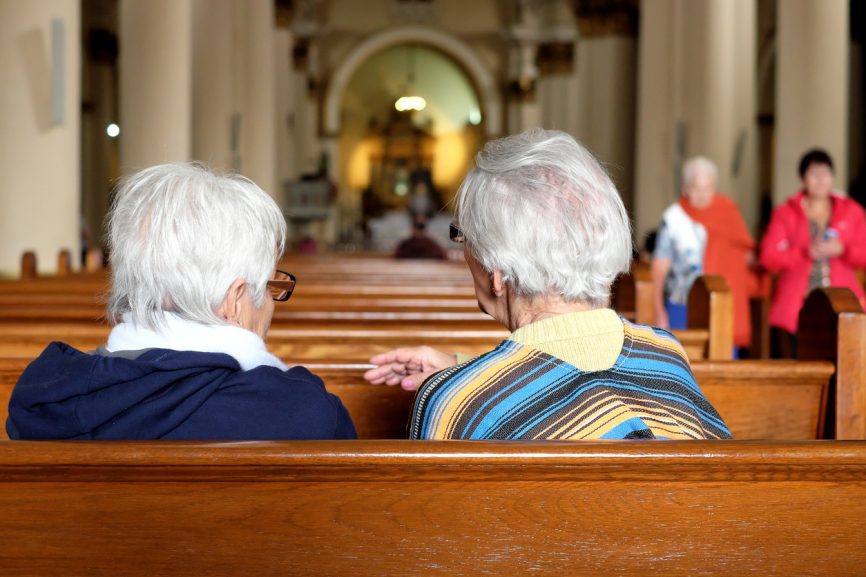by: Rev. Dr. Anna Hall
If your church membership is aging, you are not alone. In fact, a 2020 PRRI survey found that the median age of most segments of U.S. Christianity was 50 or over. The median age of white mainline, evangelical, and Catholic Christians ranged from 50-56. A 2023 EPIC study found that almost half of mainline Protestant churchgoers are over 65. It’s not easy watching our churches and their membership get older.
The problems facing aging churches can include:
- Declining optimism and morale
- Volunteer and staff burnout
- Anxiety over the lack of younger people
- Smaller attendance at church events
- Declining giving and budgets
When combined, they can leave an older congregation with a sense that there is something fundamentally wrong with their church and that their future survival is at risk.
Dealing with all of these issues at once will challenge any congregation. Yet you can address many of them with creative thinking and openness to new ways of doing church.
First, let’s talk about morale. With human capacity and energy for volunteering and attending declining, events can be sparsely attended and feel disheartening. Finances can also limit whether you can do as much as you once did. If you are experiencing this, it is time for deep discernment around what events and activities are actually essential to the life of the church. It is time to ask: Is the church trying to do too much for its size?
Inevitably, this discernment will lead to big feelings about the size the church is and the size it once was. Developing an attitude of loving acceptance might be the most challenging part of this approach. Is it possible to accept that the church has become and will likely remain much smaller than it was in the past? And beyond that, is it possible to love the church at the size and age demographic that it is currently? A targeted sermon series or Bible study can help with this issue. God’s love is not limited to those who are externally prosperous or prominent. God’s love is for all. If we believe the Beatitudes, they proclaim that those who have the least will be the most blessed.
Once the challenging work of acceptance is done, then it is time to focus on what the church is called to do and be. Every church has a purpose. Every church cannot have 27 purposes. If your congregation is aging, it is a perfect time to ask what God’s call is for your congregation during this season of its life. This is a great time for conversations with each other about our own calls for our various seasons of life. For example, our individual call and vocation were likely different in our 20s than in our 50s, 70s, or even 90s. It is the same for a congregation.

Every decade, or even more often, a congregation should find time for this deep listening. How is God calling the congregation to serve today, this month, this year?
Even if this discernment is easy and clear, we can get bogged down around issues of capacity. God is calling you as a congregation to do exactly what you are able to do in this phase of your life. This is not to say that you should not try to stretch yourself. God knows you and knows who you are. God is calling you to do what you can with what you have.
God is calling you to use your gifts wisely, not burying them in the ground, and not spreading them beyond your current capacity. So in truth, how many people do you have who can pitch in? Who can be your partners in that calling?
With your current number of people and partners, what could you reasonably accomplish within a year? Write that down. Be specific. Let that be your guiding principle for the coming year. Just remember, you can’t be called to do everything all at once. With a specific focused calling, you will find that givers are more likely to give systematically and generously. The work of loving acceptance and wise discernment can address issues of capacity, morale, burnout, and funding, if done well.
It is lovely to have people of all ages in a congregation, and you may find that you grow intergenerationally in the future, but you do not need to wait until that day for God’s love and approval. Loving your congregation just as it is demonstrates God’s love for everyone. It’s a way to model to those inside and outside of the church that God does not write anyone off. No matter their age, no matter their size, no matter their capacity, no matter what.
If you or your congregation need help navigating any of these discernments in the new year, please reach out to me. I’d love to help you get the conversation started.


Comments
A beautiful reminder to “loving acceptance.” I especially like the question, “Who can be your partners in that calling?”
Sending a document MOVING FROM SENIOR TO ELDER that reflects a new vision for Myers Park Baptist Church (Charlotte) seniors.
Love these ideas!